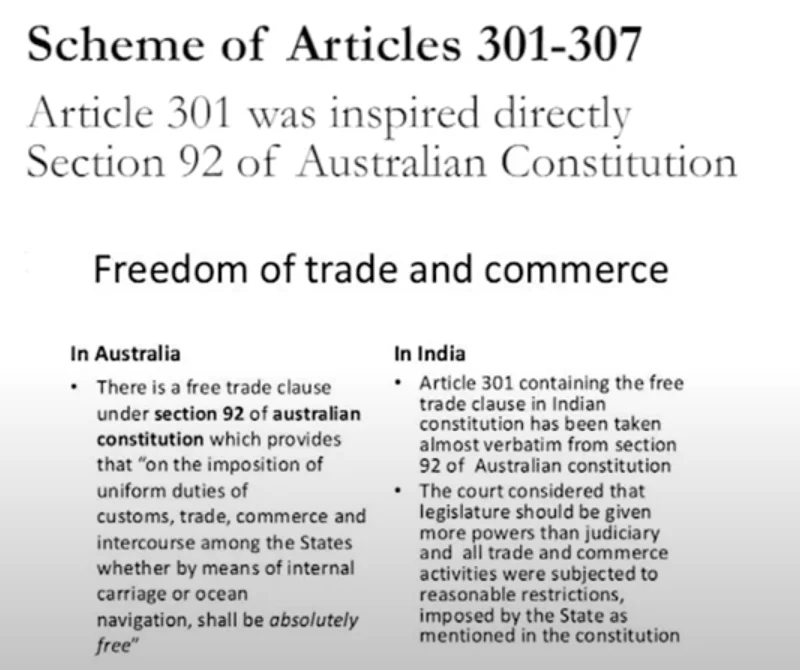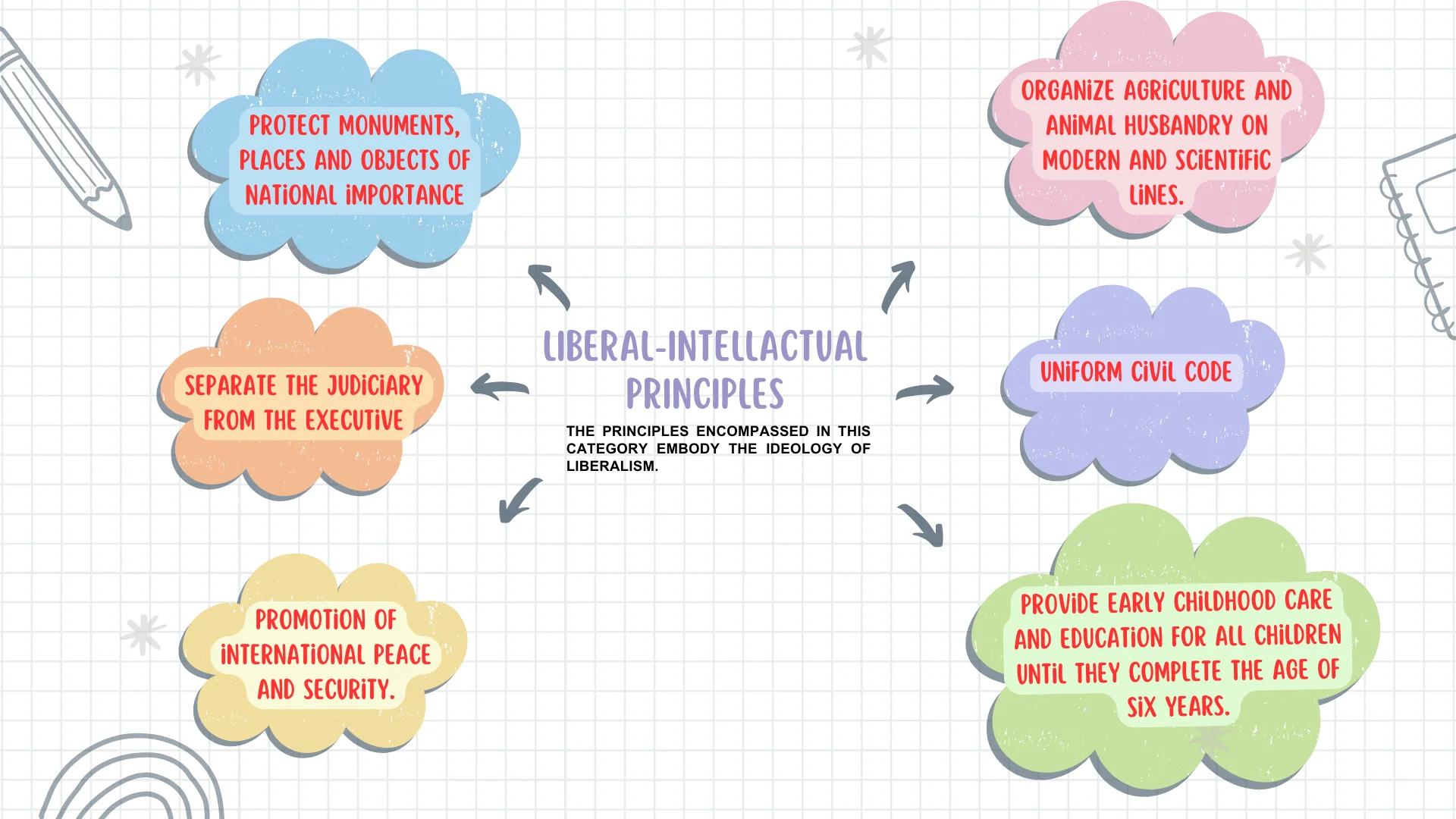Inter-State trade and commerce are crucial for a nation’s economic growth, driving unity and prosperity. In India, Articles 301 to 307 of the Constitution support unrestricted trade across states, while allowing reasonable limitations for public interest. This framework ensures a balanced and fair trading environment throughout the country.
Inter-State Trade and Commerce in India
Constitutional Framework of Inter-State Trade and Commerce in India
- Importance of Inter-State Trade and Commerce: The seamless exchange of goods and services across different regions of a nation is not merely a commercial activity, it is the lifeblood of economic growth and prosperity.
- It plays a pivotal role in driving economic unity, fostering national integration, and promoting the overall well-being of the population.
- Constitutional Framework: The cornerstone of inter-State trade and commerce in India is enshrined in Articles 301 to 307 of the Constitution.
- Principle of Unrestricted Trade and Commerce: These articles uphold the principle of unrestricted trade, business, and intercourse across the country, subject only to reasonable limitations imposed for the public interest.
- Limitations for Public Interest: While Article 301 guarantees this freedom, subsequent articles within Part XIII meticulously outline the limitations that ensure equitable and just trade practices.

Enroll now for UPSC Online Course
Limitations on Inter-State Trade and Commerce in India
Non-Absolute Nature: The freedom of inter-State trade and commerce, enshrined in Article 301 of the Indian Constitution, is not absolute.
- Constitutional Limitations: To maintain a balance between trade freedom and public interest, the Constitution imposes various limitations on this freedom:
- Parliament’s Authority to Impose Restrictions (Article 302)
-
- Parliament can impose non-discriminatory restrictions on trade and commerce in the public interest, such as regulating essential commodities to prevent scarcity and ensure equitable distribution.
- Non-Discrimination between States (Article 303(1))
- Neither Parliament nor State legislatures can enact laws that grant preferential treatment to one State over another or discriminate between States in matters of trade and commerce.
- Parliament’s Power during Scarcity (Article 303(2))
- In times of scarcity, Parliament can enact discriminatory laws to ensure fair distribution of goods across India.
- State Taxation on Imported Goods (Article 304)
- State legislatures can impose non-discriminatory taxes on goods imported from other States, provided they are similar to taxes imposed on intra-State goods.
- Reasonable restrictions can also be placed on intra-state trade in the public interest, subject to the President’s prior sanction.
- State Trading (Article 19(6)(4))
- The appropriate legislature can enact laws enabling the State or State-owned corporations to engage in trade, business, or industry for the public benefit.
- Enforcement Authority (Article 307)
- Parliament can appoint authorities to enforce the provisions of Articles 301 to 304 and confer necessary powers and duties.
Constitutional Provisions for Inter-State Trade and Commerce
-
The Foundation of Trade Freedom: Article 19(1)(g) and Article 301
-
- Fundamental Right: The right to engage in trade and business is enshrined in Article 19(1)(g) of the Constitution, guaranteeing Indian citizens the freedom to pursue their economic aspirations.
- Reinforcement of Trade Freedom: This fundamental right is further reinforced by Article 301, which declares that trade, commerce, and intercourse shall flow freely throughout the territory of India.
-
The Purpose of Part XIII: Fostering Economic Unity
-
- Objective of Part XIII: The overarching objective of Part XIII is to dismantle barriers between States, promoting the seamless movement of goods, services, and individuals across India.
- Unified Economic Space: This goal extends not only to inter-State activities but also to intraState transactions, ensuring a unified economic space within the country.
Challenges in Inter-State Trade and Commerce
Challenges in Inter-State Trade and Commerce: Despite the constitutional framework designed to promote inter-State trade and commerce, persistent challenges hinder the seamless flow of goods, services, and individuals across India.
- Need for Innovative Solutions: These challenges demand careful attention and innovative solutions to ensure a more efficient and unified economic space within the country.
- Navigating Scarcity (Article 303(2))
- Effectively managing scarcity situations and ensuring equitable distribution of goods under Article 303(2) requires a delicate balance between the need for intervention and the preservation of trade freedom.
- Simplifying the Regulatory Framework: The complex interplay of numerous laws, regulations, and executive orders governing inter-State trade and commerce creates an intricate and often confusing regulatory environment.
- Streamlining and harmonising these provisions is essential to reduce compliance costs, enhance transparency, and promote predictability for businesses and individuals engaged in inter-State activities.
- Mitigating the Impact of Legislative Actions: Legislative and executive actions, such as the imposition of tariffs, taxation policies, and procurement regulations, can have significant and sometimes unintended consequences for inter-State trade and commerce.
- Robust regulatory mechanisms and stakeholder engagement are crucial to assess the potential impacts of such actions and ensure that they do not unduly burden businesses or hinder the free flow of goods and services.

Enroll now for UPSC Online Course
| Must Read | |
| Current Affairs | Editorial Analysis |
| Upsc Notes | Upsc Blogs |
| NCERT Notes | Free Main Answer Writing |
Conclusion
Despite constitutional support, challenges in inter-State trade, such as regulatory complexity and scarcity management, persist.
- Simplifying regulations and mitigating adverse impacts are key to enhancing trade efficiency.
- Addressing these issues will help maintain a seamless and unified economic space in India.
Sign up for the PWOnlyIAS Online Course by Physics Wallah and start your journey to IAS success today!
| Related Articles | |
| Features of Indian Constitution | Population in India |
| Fundamental Rights (Article 12-35) | Economic Growth |

 GS Foundation
GS Foundation Optional Course
Optional Course Combo Courses
Combo Courses Degree Program
Degree Program










